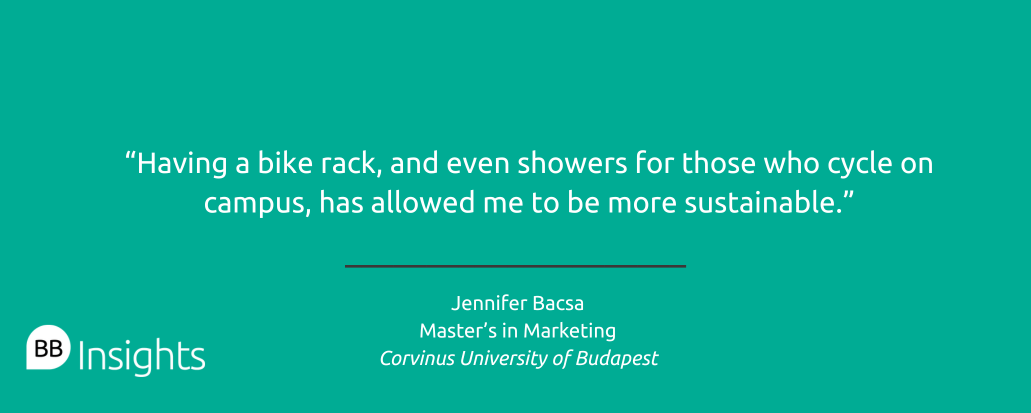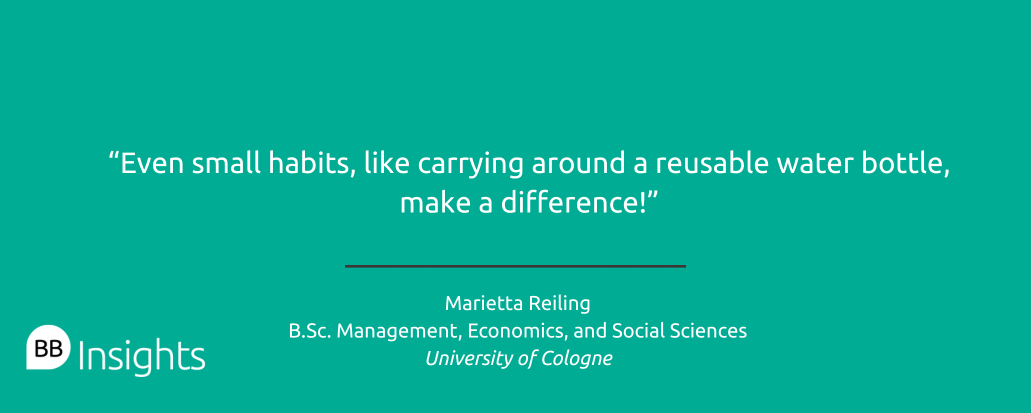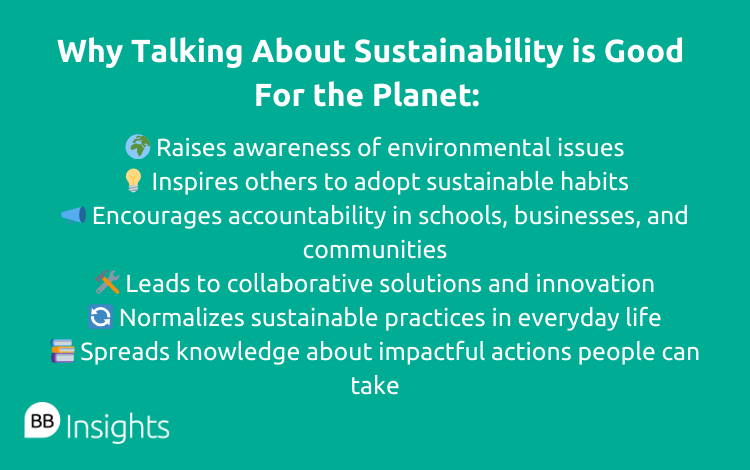With governments across much of the globe investing in renewable energy, and businesses implementing carbon reduction tactics, the transition to a greener world of business is well underway. In fact, according to the latest World Economic Forum Future of Jobs Report, climate change adaptation is expected to become the third-largest contributor to net growth in global jobs by 2030.
As such, it’s important that b-school students—the business leaders of tomorrow—try to lead lifestyles aligned with this shift, positioning themselves ahead of the curve and future-proofing their careers.
At first, the prospect of ‘trying to be more sustainable’ while studying can seem daunting, even overwhelming. However, it’s not about perfection; there are plenty of small changes every business school student can make that will benefit our planet.
We spoke with students and professors to uncover the sustainable habits every b-school student can embrace.
The sustainable habits every b-school student can adopt
1. Forget paper, learn how to go fully digital
While digital resources are increasingly used, studying at business school can still generate unnecessary paper waste if you rely on textbooks, handouts, or printing your assignments.
As such, an easy way to minimize your consumption while at b-school is to eliminate paper use where possible, using the printer only when strictly necessary.
Aalto University School of Business student and sustainability lead for KY—the school's student association—Elsa-Maria Oksanen, notes that she has already started implementing these practices in an effort to be more sustainable while studying:
“I rarely use paper and rely mostly on digital materials where possible. This has been very easy to achieve, thanks to Aalto’s emphasis on sustainability and our access to online portals for papers and publications.”
Marietta Reiling, a BSc Management, Economics, and Social Sciences student at the University of Cologne, has also adopted this approach:
“I’ve gone paperless for my entire degree—textbooks, notes, everything’s digital.”
For other b-school students looking to follow in Marietta’s footsteps, there are plenty of digital note-taking apps available, such as Microsoft OneNote, Evernote, Google Keep, and Notion.
Some business school students have taken a step further by actively developing digital platforms aimed at reducing the paper waste generated by campus life. For example, Tabea Knuehl, a 22-year-old student from Mannheim Business School, has helped create a solution for flyer waste:
“As the speaker of a student-led sustainability initiative, I have helped launch Flyra, an app designed to reduce flyer waste. I’m very proud to have been part of this project, which is helping the environment.”
2. Embrace sustainable travel
Taking public transport or using an active mode of transportation, such as walking or cycling, is a very effective way for b-school students to reduce their carbon footprint and improve local air quality.
“I try to exclusively travel by public transport or use my bicycle. Luckily, the public transport in Helsinki—where my school is situated—is so good that I don’t need to own a car anyway,” says Elsa-Maria.
Emma Karppinen, another student from Aalto and an executive board member of KY, has also leveraged the location’s excellent public transport options to try and be more eco-friendly:
“I’m using public transport as much as possible to be more sustainable at business school, and I’m really enjoying it so far. It feels great to be doing something good for the planet.”
Using these transportation methods can also significantly benefit student mental health, providing time to connect with other students, immerse oneself in nature, and get some exercise. This is especially important as completing a degree program can often be intellectually strenuous.

3. Learn about and support your school's sustainability initiatives
Many b-schools now offer both online and on-campus sustainability initiatives for students to get involved in, including annual and one-off events.
Jennifer Bacsa, a master’s student in Marketing at Corvinus University of Budapest, notes that she regularly takes advantage of her school’s eco-events, using them to become more conscious of the impact her habits are having on the environment.
“I think what is unique is that Corvinus hosts a farmers’ market three times a year, featuring local producers who have graduated from the school.
“I love going—it’s a great way to support the community, and it allows me to purchase locally grown products, ultimately reducing my carbon footprint,” she adds.
For b-school students looking to make a difference on a larger scale, some student leadership roles allow them to shape the direction of their school’s sustainability efforts. For instance, Emma explains that her role at the Aalto KY office involves pushing environmental messages to students:
“As head of communications, I’m always taking sustainability into account—looking at how we can promote it through our messaging.”
Some students have even expanded their impact beyond business school itself, considering how education more broadly can be made more sustainable.
“I participated in a weeklong United Nations Sustainable Business Challenge, working with students from several countries around the world. During it, we raised awareness of the Sustainable Development Goals (SDGs) and came up with creative solutions to enhance sustainability action among university students,” says Justine Schramm, a student at the University of Cologne.
4. Recycle, re-use, and learn to share resources
While being a busy student, often mundane tasks such as recycling are the last thing on your mind. However, it’s important to maintain these positive environmental habits, as they help prevent waste from going to landfill and reduce the need for new raw materials.
Many b-schools provide on-campus recycling schemes that students can take advantage of. For example, Jennifer shares that she’s able to recycle various materials at her school:
“There are many recycling points that make it easier for me to practice my sustainability principles, including a bottle recycling machine, a collection point for used batteries, and general recycling bins.”
Being an international or exchange student can generate a great deal of additional waste, as newcomers often need to find accommodation and re-purchase items that they couldn't bring. This can include everything from toiletries to bedding and kitchen supplies.
Recognizing this issue, Tabea has contributed by helping launch a solution focused on reducing that waste:
“I’ve helped launch MaExchange, a sharing platform for kitchen items, especially aimed at exchange students. I'm pleased to have helped find a sustainable solution to this unique problem.”
For students who find that their business school lacks adequate recycling schemes, there are a variety of programs they can suggest that their school adopts. One example is TerraCycle, which sells zero waste boxes for hard-to-recycle materials, including empty medicine blister packs, plastic packaging, and beauty product containers. Introducing these kinds of solutions on campus could significantly enhance a school’s sustainability status.

5. Choose sustainability-focused modules
With the world of business expected to become greener, most business school programs now include sustainability-focused modules, designed to equip students with vital skills to navigate and lead in an increasingly environmentally conscious landscape.
“Sustainability is a big topic that’s covered in my modules. For instance, I selected a course titled The Economics of Climate Change, which has helped me understand the impact businesses can have on the planet,” says Justine.
For some students, including Elsa-Maria, studying environmentally-focused content at business school has even helped them identify their specific areas of interest. Learning along the way which areas of sustainability in business they might even want to pursue a career in:
“I major in marketing, and I’ve become especially interested in sustainability from the consumer’s perspective and how companies communicate these values.”
Learning about sustainability from a business perspective not only helps future-proof a student's career but also broadens their understanding of sustainability, enabling them to make more conscious choices in their own daily life.
“In our classes, sustainability is a key focus. Students can participate in sustainability research projects, which have taught me how to make a real impact in both business and my personal life, as well as how to raise awareness of the issues our planet is facing,” says Jennifer at Corvinus.
6. Start the sustainability conversation
A very easy and effective way for b-school students to become more sustainable is simply by talking about it, whether within friendship groups, societies, or even during internships.
Helen Goworek, professor of marketing and MSc marketing program director at Durham University Business School, emphasizes this message:
“The best way for students to help reduce society’s impact on the environment is to share their sustainable habits and what they have learned with others.
“If sustainability efforts by the university are not obvious enough, then I highly recommend students ask staff about them—to find out more or to encourage changes to be made,” she adds.
Drawing attention to the issue and starting conversations plays a key role in driving positive change, helping to open people up to the many actions they can take to live and work more sustainably. Ultimately, by normalizing the discussion, students can inspire others and promote accountability within their communities, schools, and even future workplaces.

From recycling to getting involved in their school’s sustainability initiatives, there are countless habits business school students can adopt to help build a better, healthier world.



